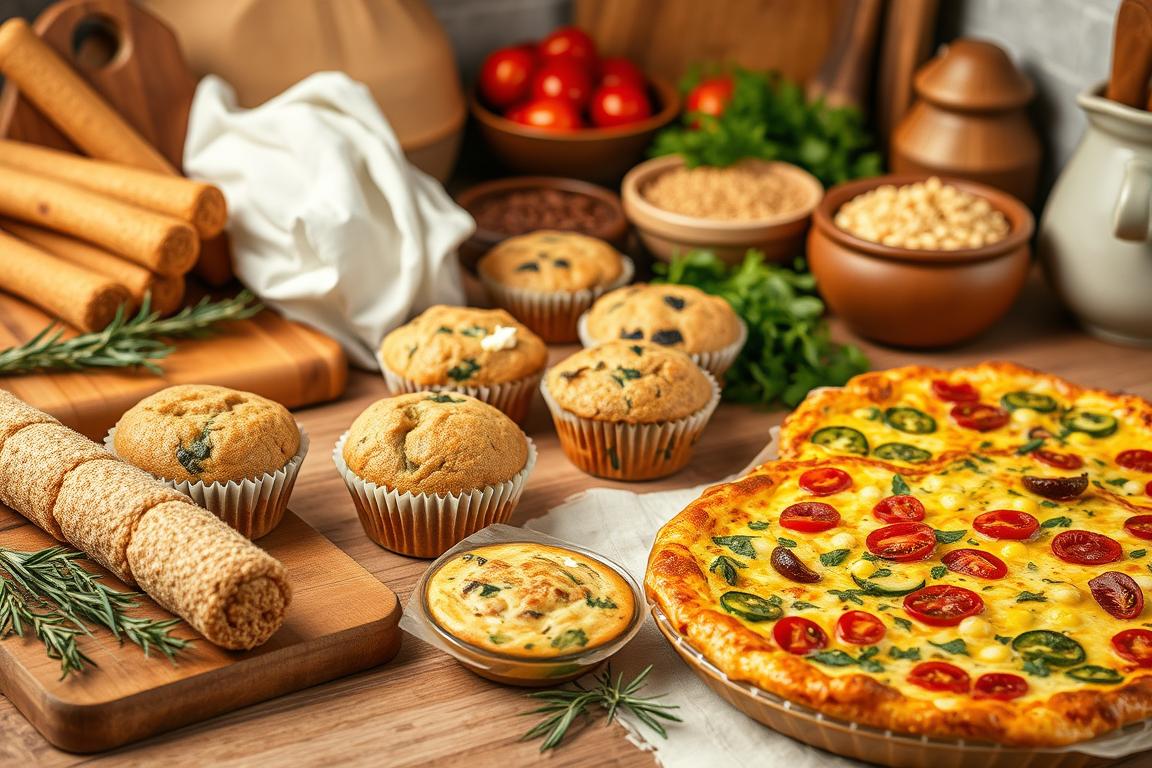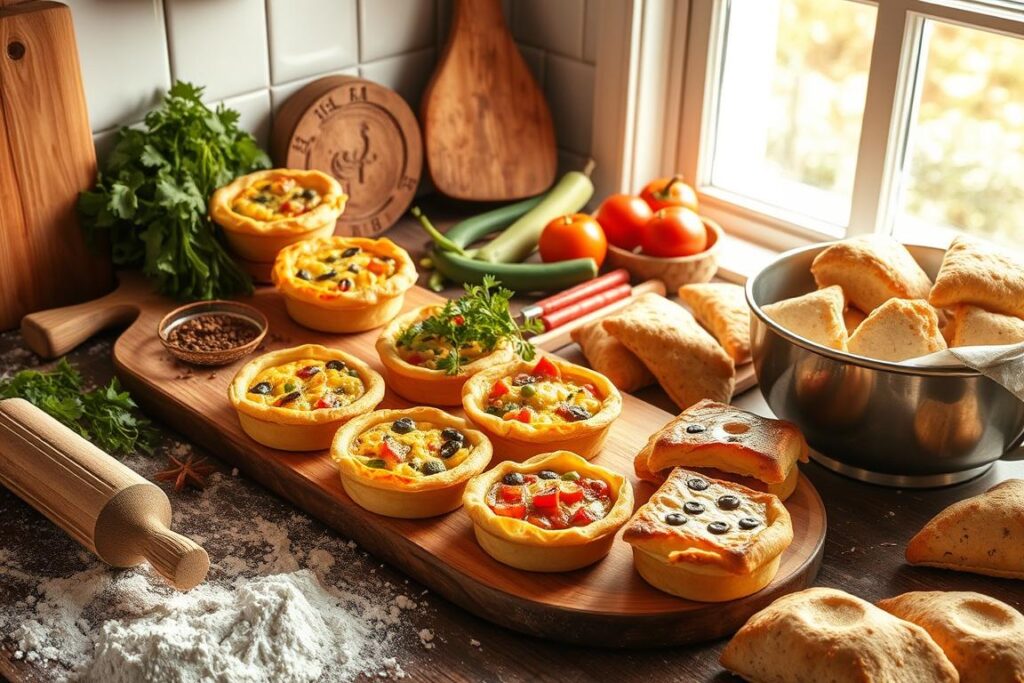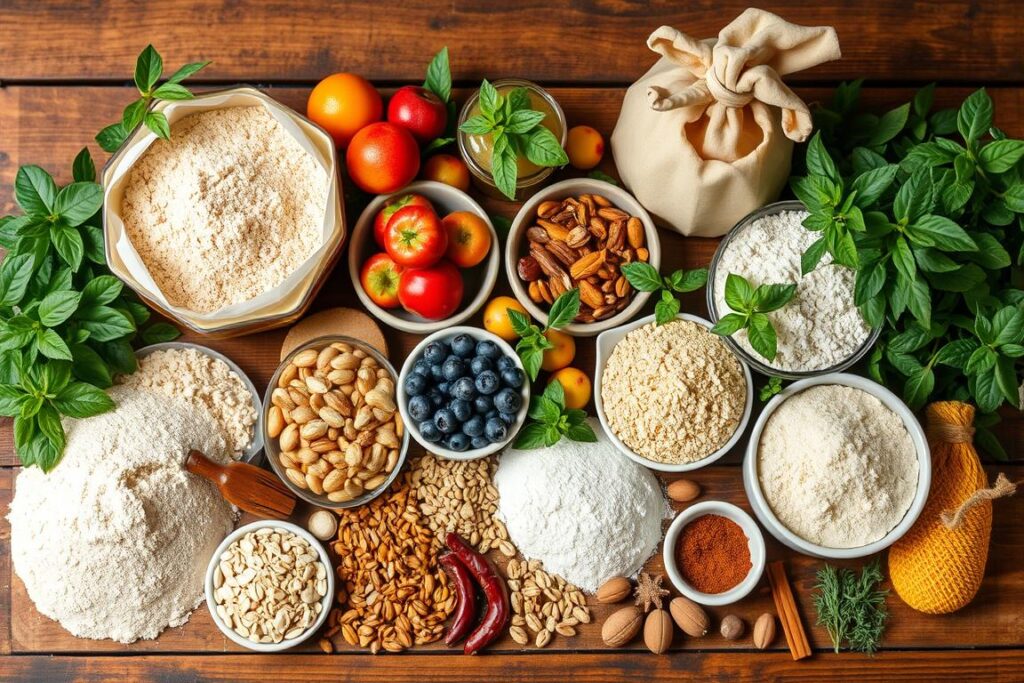
Imagine walking into your kitchen and making delicious, nutritious meals. These meals not only taste great but also make your body happy. Healthy baking recipes have changed how we cook, making old favorites healthier.
With whole grain flour and natural sweeteners, you can make amazing savory dishes. These dishes are full of nutrients, flavor, and creativity. Whether you’re busy or health-focused, these recipes will change how you see food.
Key Takeaways
- Discover the power of whole grain flour in creating nutritious baked goods
- Learn how natural sweeteners can enhance flavor without compromising health
- Explore innovative savory baking techniques
- Transform traditional recipes into nutrient-rich meals
- Embrace a healthier approach to cooking and eating
Understanding Savory Baking Fundamentals
Diving into savory baking opens a world of tasty options for home cooks. It’s a chance to try healthy, creative recipes. Whether you’re into dairy-free, gluten-free, or vegan baking, learning the basics will change your cooking game.
One example of a delicious and nutritious option is banana blueberry oatmeal cookies, which use natural fruit sweetness and fiber-rich oats.

Essential Equipment for Savory Baking
Getting ready for savory baking means having the right tools:
- High-quality baking sheets with non-stick surfaces
- Precise measuring cups and digital kitchen scale
- Versatile mixing bowls in various sizes
- Silicone spatulas for smooth ingredient incorporation
- Reliable oven thermometer for accurate temperature control
Basic Techniques for Perfect Results
Learning basic techniques is key for great gluten-free and dairy-free baking. Ingredient preparation is vital. Always measure accurately and let ingredients warm up before mixing.
“Baking is a science that requires precision and creativity” – Professional Baker’s Wisdom
Temperature and Timing Guidelines
For successful vegan baking, knowing about temperature is important. Different ingredients react differently to heat. So, following specific guidelines is a must.
| Ingredient Type | Optimal Temperature | Recommended Baking Time |
|---|---|---|
| Gluten-free Flour Blend | 350-375°F | 20-25 minutes |
| Oat-based Recipes | 325-350°F | 15-20 minutes |
| Vegetable-based Bakes | 375-400°F | 25-30 minutes |
Keep in mind that ovens can vary. Always use an oven thermometer. And check your baked goods a few minutes before the suggested time.
Benefits of Choosing Healthy Baking Alternatives
Changing how you bake can bring big health benefits. Using nutrient-rich ingredients is changing the game for tasty treats. With superfoods and low-fat methods, you can make healthy, delicious recipes.

Trying out different flours can really improve your health. Here’s why:
- More nutrients than regular flour
- Less impact on blood sugar
- Better taste
- Good for many diets
“Baking can be both a delicious art and a pathway to better health.” – Nutrition Experts
Each alternative flour has its own health benefits:
| Flour Type | Key Nutritional Benefits | Best Used In |
|---|---|---|
| Almond Flour | High in protein, magnesium, iron | Cookies, cakes |
| Coconut Flour | High fiber, low carbohydrate | Muffins, bread |
| Oat Flour | Whole grain, heart-healthy | Pancakes, waffles |
The American Heart Association says to watch saturated fats. Low-fat baking is key. Adding superfoods like chia seeds or nuts makes your baked goods healthier and tastier.
Pro tip: Start with small amounts of alternative flours to learn how they work in your recipes.
High-Protein Cottage Cheese Muffins
Discover a delightful twist on healthy baking recipes with these protein-packed cottage cheese muffins. They are perfect for clean eating desserts, giving you a nutritious choice instead of traditional baked goods.
These muffins are a game-changer for anyone looking for nutritious and delicious breakfast or snack options. With 6 grams of protein per muffin, they keep you satisfied and energized.
Key Ingredients and Substitutions
- ¾ cup cottage cheese (provides approximately 25 grams of protein)
- 2 large eggs
- 1 ¾ cups oat flour
- ¼ cup maple syrup
- ¼ cup olive oil
- 2 teaspoons vanilla extract
- 1 teaspoon cinnamon
You can easily customize these healthy baking recipes with various substitutions:
- Replace pumpkin puree with banana or applesauce
- Add ½ cup chocolate chips for extra indulgence
- Experiment with different spices like pumpkin spice
Step-by-Step Preparation Guide
- Preheat oven to 350°F
- Mix wet ingredients thoroughly
- Combine dry ingredients separately
- Blend wet and dry mixtures
- Fill muffin cups ½ full
- Bake for 22-25 minutes
- Cool for 5-10 minutes before serving
Storage and Freezing Tips
| Storage Method | Duration | Reheating Instructions |
|---|---|---|
| Refrigerator | 4-5 days | Microwave 10-15 seconds |
| Freezer | 3 months | Thaw overnight in refrigerator |
“Healthy eating doesn’t mean sacrificing flavor – these cottage cheese muffins prove that nutritious can be delicious!” – Nutritionist Sarah Green
With just 175 calories per muffin and a stellar 4.87/5 rating from 23 user votes, these clean eating desserts are a nutritional powerhouse that doesn’t compromise on taste.
Wholesome Savory Oat Bakes
Discover the magic of creating delicious and nutritious savory oat bakes. They can change your breakfast routine. Use whole grain flour and nutrient-dense ingredients to make a meal that’s satisfying and healthy.
Savory oat bakes are versatile for home cooks. They mix the hearty texture of oats with many flavorful ingredients. This makes them great for busy mornings or quick lunches.
Key Ingredients for Success
- Old-fashioned rolled oats
- Eggs for protein
- Milk (dairy or plant-based)
- Fresh vegetables
- Herbs and spices
Your savory oat bakes can include many nutrient-dense ingredients. Shredded carrots, spinach, or lean proteins are great options. The trick is to balance flavors while keeping it healthy.
“Baked oatmeal isn’t just a breakfast—it’s a canvas for culinary creativity!” – Nutrition Expert
Nutritional Breakdown
| Nutrient | Per Serving |
|---|---|
| Calories | 300 |
| Protein | 29g |
| Carbohydrates | 53g |
| Fiber | 7g |
Try different combinations of whole grain flour and nutrient-dense ingredients. Create your perfect savory oat bake. From Mediterranean herbs to spicy southwestern flavors, the options are endless!
Incorporating Vegetables in Baked Goods
Adding vegetables to your baked goods can change your cooking world. Vegetables are no longer just for salads. They’re now key parts of tasty, healthy treats that are full of flavor and nutrients.
Using vegetables in your baking has many advantages. Studies show that baked goods with vegetables can:
- Need less added sugar
- Stay moist longer
- Be more nutritious
- Taste better
Best Vegetables for Baking
Some of the best vegetables for baking are:
- Zucchini: Adds moisture and fiber
- Sweet Potato: Provides natural sweetness
- Carrots: Enhances color and nutrition
- Butternut Squash: Creates rich, creamy textures
Preparation Methods
Getting your vegetables ready for baking is important. Here are some ways to do it:
- Grating for even distribution
- Roasting to concentrate flavors
- Pureeing for smooth integration
- Draining excess moisture
Moisture Control Techniques
Managing moisture is key when using vegetables in baking. Pat dry shredded vegetables, use salt to remove excess liquid, or adjust flour amounts for the right texture in your baked goods.
Pro tip: Try different vegetables to find new flavors and health benefits in your baked treats!
Healthy Baking Recipes for Meal Prep
Changing your meal prep with clean eating desserts and low-fat baking can boost your nutrition. Meal prep saves time, lowers stress, and helps you reach your health goals. It gives you healthy food choices all week.
“Meal prep is not just about saving time—it’s about investing in your health one recipe at a time.”
When you plan your meal prep, pick recipes that are tasty and healthy. Low-fat baking lets you make tasty dishes without losing flavor or health benefits.
- Prepare recipes that can be stored for 4 days in the refrigerator
- Create balanced portions with protein, healthy fats, and complex carbohydrates
- Use meal prep containers to organize individual servings
Here are some smart meal prep ideas for clean eating desserts:
| Recipe Type | Prep Time | Yield | Storage |
|---|---|---|---|
| Oat-Based Muffins | 40 minutes | 12 pieces | 4 days refrigerated |
| Protein Bars | 30 minutes | 8 servings | 5 days refrigerated |
| Vegetable Bakes | 45 minutes | 10 servings | 3-4 days refrigerated |
Adding low-fat baking to your meal prep lets you make healthy, tasty dishes. Try using almond flour, ground flaxseed, and natural sweeteners to make your recipes better.
Gluten-Free and Dairy-Free Options
Navigating dietary restrictions doesn’t mean you have to give up on delicious baked goods. With the right ingredients and techniques, you can make mouthwatering gluten-free and dairy-free treats. These are sure to please everyone.
Modern baking has changed how we handle special dietary needs. Vegan baking and using alternative ingredients make it easy to enjoy your favorite treats. You don’t have to sacrifice taste or nutrition.
Alternative Flour Choices
Exploring gluten-free flour options can be very creative. Here are some top alternatives:
- Almond flour – nutrient-dense and protein-rich
- Coconut flour – low-carb and high in fiber
- Oat flour – smooth texture and mild flavor
- Chickpea flour – high in protein
Plant-Based Dairy Substitutes
Dairy-free baking has never been more delicious. Here are some amazing milk alternatives:
| Milk Alternative | Key Benefits | Best Used In |
|---|---|---|
| Coconut Milk | Creamy texture, rich flavor | Moist cakes, puddings |
| Almond Milk | Low calorie, nutty taste | Cookies, quick breads |
| Oat Milk | Smooth consistency | Muffins, pancakes |
“Dietary restrictions are an opportunity for culinary creativity, not a limitation.” – Wellness Chef
With these alternatives, you can turn traditional recipes into delicious gluten-free and dairy-free treats. These are perfect for everyone to enjoy.
Nutritious Ingredients and Their Benefits
Start your baking journey by learning about nutrient-dense ingredients. These ingredients are packed with nutrients. They can turn your baked goods into health-boosting treats.
Choosing the right ingredients is key. Whole grains like oat and whole wheat flour offer big benefits:
- 3x more fiber than refined grains
- Better blood sugar control
- Up to 25% less risk of chronic diseases
Superfood ingredients are also worth exploring. Here are some nutritional powerhouses:
- Chia seeds: Give 2.5 grams of omega-3 fatty acids per serving
- Greek yogurt: Adds 5-10 grams of protein
- Chickpea flour: Has 22 grams of protein per cup
“Nutrition is not about eating less, but eating right.” – Unknown
Switching to nutrient-dense ingredients can make your baking healthier. For example, using fruit purees can cut calories by 50-100 per serving. They keep your treats moist and flavorful.
By picking and using these nutrient-rich ingredients, you’ll make baked goods that are tasty and good for you. They’ll support your health journey.
Tips for Reducing Fat and Salt Content
Changing your savory baking to be healthier doesn’t mean losing flavor. Low-fat baking lets you cut down on bad ingredients while keeping the taste great.
To reduce fat and salt, you need to swap out ingredients and try new cooking methods. Learning to make flavors pop naturally helps make your baked goods healthier.
Natural Flavor Enhancers
Get more taste without too much salt by using these natural boosters:
- Fresh herbs like rosemary, thyme, and basil
- Citrus zest for bright, tangy notes
- Roasted garlic for deep, rich flavor
- Smoked paprika for complexity
- Nutritional yeast for a cheesy undertone
Healthy Oil Alternatives
Choosing the right oils for low-fat baking can make your recipes healthier:
- Applesauce as a partial butter replacement
- Mashed avocado for creamy texture
- Greek yogurt to maintain moisture
- Pureed vegetables like pumpkin or zucchini
“Healthy cooking is about making smart ingredient choices that nourish your body without compromising taste.”
Natural sweeteners can also help in savory baking. They balance flavors without adding refined sugars. Try using a little honey, maple syrup, or pureed dates to add a touch of sweetness.
With these tips, you can make tasty, healthy baked goods that everyone will love.
Make-Ahead and Storage Solutions
Learning how to make ahead and store can change your baking game. It turns your healthy treats into easy meal prep options. Clean eating desserts need smart planning to stay fresh and healthy.
Good storage tips can make your homemade treats last longer. They stay tasty and full of nutrients with the right care.
Storage Duration Guidelines
| Baked Good | Refrigerator Storage | Freezer Storage |
|---|---|---|
| Muffins | 3-4 days | Up to 3 months |
| Savory Oat Bakes | 5-6 days | Up to 2 months |
| Vegetable-Based Bakes | 4-5 days | Up to 1 month |
Right storage keeps your desserts fresh and tasty. Here are some tips to keep your baked goods in top shape:
- Use airtight containers to prevent moisture and maintain texture
- Label containers with preparation dates
- Cool baked goods completely before storing
- Separate layers with parchment paper to prevent sticking
“Meal prep is about working smarter, not harder in the kitchen.” – Nutrition Expert
Freezing is a great way to keep your baked goods fresh. Most savory bakes and clean eating desserts can be frozen for 1-3 months without losing quality. Just thaw them in the fridge overnight and reheat gently to keep them moist and flavorful.
With these storage tips, you’ll cut down on waste, save time, and always have healthy treats ready to go.
Common Mistakes to Avoid in Healthy Savory Baking
Mastering healthy savory baking needs precision and knowledge. Working with whole grain flour can be tricky. Knowing these common mistakes helps you make tasty and healthy dishes.
“Baking is a science, and precision is key to success.” – Professional Baker’s Wisdom
Here are key mistakes to avoid in vegan baking and using whole grain flour:
- Overmixing batter, which can increase density by up to 20%
- Incorrect liquid ratios when substituting ingredients
- Neglecting to adjust cooking times for whole grain flours
- Failing to properly measure ingredients
When substituting ingredients in vegan baking, be careful. Not all replacements are created equal. Replacing eggs requires understanding their binding and moisture roles.
| Common Mistake | Potential Consequence | Solution |
|---|---|---|
| Overmixing whole grain flour | Dense, tough baked goods | Mix just until ingredients are combined |
| Incorrect liquid measurements | Dry or overly wet texture | Use precise measuring tools |
| Skipping ingredient prepping | Uneven flavor distribution | Properly prepare and measure ingredients |
Preheating your oven is key. Baked items can take 25% longer to cook if the temperature isn’t right. Use an oven thermometer for accurate and consistent results in your healthy baking.
Conclusion
Your journey into healthy baking has opened up a world of tasty options. You’ve learned to use whole grain flours, natural sweeteners, and new ingredients. This turns simple baking into a fun and healthy adventure.
Understanding how to swap out ingredients is key to healthy baking. You’ve discovered ways to make brownies moist with zucchini and use ground flaxseed instead of eggs. These tricks help make your baked goods healthier without losing flavor or texture.
Healthy baking is about making better choices, not cutting out treats. You can use almond flour, coconut oil, and natural sweeteners to make tasty treats that are good for you. This knowledge lets you try new things and enjoy baking that’s good for your health.
Keep exploring and being creative in your baking. The variety of healthy ingredients lets you make new versions of old favorites. Every bite becomes a celebration of health and taste.
